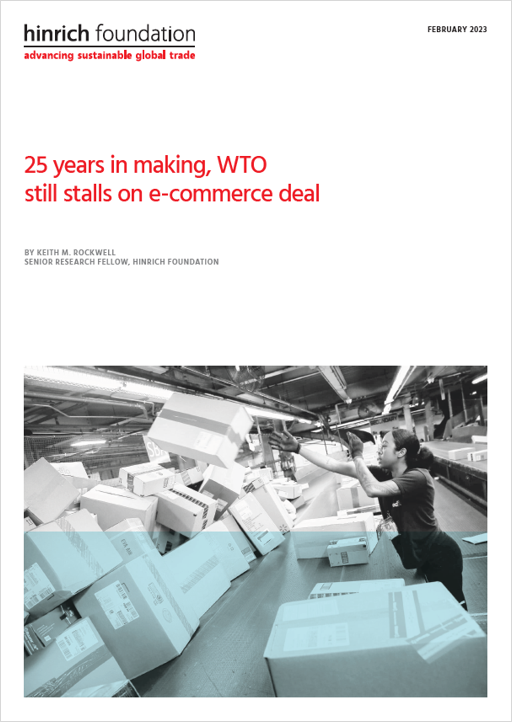Published 28 February 2023
For many businesses, the ongoing WTO talks to draw up new multilateral rules on e-commerce may be the most consequential global trade negotiations underway today. If the negotiations end in stalemate, that would mean another body blow to the credibility of the Geneva-based institution and higher trade costs around the world.
All statistical indicators point to e-commerce sales growing sharply for years to come. Yet, there are no global rules to govern e-commerce. Ongoing talks among 87 members of the 167-strong World Trade Organization (WTO) to map out new multilateral rules for digital trade could result in an agreement that shaves billions off trade costs. But a collapse in negotiations could entrench the fragmentation of global digital regulations, lock many small companies out of international markets, and propel the already conflict-strewn high tech sector into a spiral of trade retaliation. The stakes are getting higher and higher.
In this paper, Hinrich Foundation Senior Research Fellow Keith Rockwell traces the long process of e-commerce talks at the WTO since conversations began in 1998 and the rise of bilateral and regional agreements amid a WTO impasse. Three blocs of e-commerce governance have emerged globally, complicating the progress toward an agreement as the talks get mired in the interplay of politics. Rockwell examines the case for extending the WTO moratorium on applying duties on e-commerce transmissions and why certain countries oppose the idea. If the negotiations fail to reach a consensus at the WTO, the future of e-commerce would begin to dim.
Download 25 years in making, WTO still stalls on e-commerce deal by Keith Rockwell:

© The Hinrich Foundation. See our website Terms and conditions for our copyright and reprint policy. All statements of fact and the views, conclusions and recommendations expressed in this publication are the sole responsibility of the author(s).
Author
Keith M. Rockwell
Keith M. Rockwell is a Senior Research Fellow at the Hinrich Foundation. Prior to his retirement in June 2022, Keith served as a Director at the World Trade Organization (WTO) and spokesperson for the organization for more than 25 years. He also is Global Fellow at the Wilson Center.
Have any feedback on this article?
Related Articles

Emergent digital fragmentation: The perils of unilateralism
28 June 2022

Data is disruptive: How data sovereignty is challenging data governance
03 August 2021

Emergent digital fragmentation: The perils of unilateralism
28 June 2022

Data is disruptive: How data sovereignty is challenging data governance
03 August 2021

Emergent digital fragmentation: The perils of unilateralism
28 June 2022




